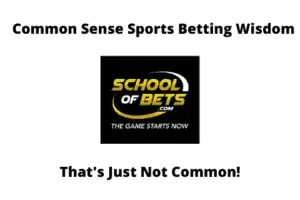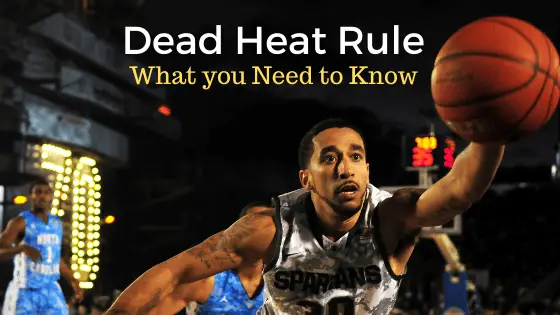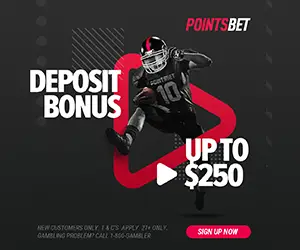The term ‘dead heat’ comes from horse racing where originally horses ran multiple times in the day with the winner being the horse who won the most heats. If a race was a tie the heat was deemed ‘dead’ and did not count.
So what does this have to do with sports betting and more importantly how will affect your payouts?
What is the Dead Heat Rule in Sports Betting?
The dead heat rule is enacted by sportsbooks when more than the required number of selections ‘win’. Basically that means your bet tied with another outcome.
For example in the NFL when a bettor bets a first quarter market and the two teams end the period on the same score it is deemed a ‘tie’. A sportsbook will employ the dead heat rule to decide on moneyline payouts as neither team lost and the tie was not offered as a market option. Under the dead heat rule bettors receive half their original odds meaning their payout is halved.
Why is the Dead Heat Rule Used in Sports Betting?
The dead heat rule is employed by sportsbooks to make a payout decision when two outcomes tie. This is most commonly seen in Moneyline markets where two teams tie and there is no further way to separate them. The key is the ‘tie’ option must not be offered as a betting option in the original market.
This is why soccer does not employ the dead heat rule. Soccer moneyline markets will always offer the tie (or draw) as a legitimate option as it is occurs often. In sports like the NBA and NHL ties never occur on regular time moneyline markets as overtime is played until a winner is decided.
But in many exotic markets such as quarters betting and first half betting the tie can happen. In these cases sportsbook prefer to use the dead heat rule instead of deeming the event a push. A push equals a refund and sportsbooks are unable to keep their margin if they refund all bets. When the dead heat rule is in play bets will be paid out and books get their take?
How Does the Dead Heat Rule Work?
If a sports betting event is deemed a ‘dead heat’ then bettors will receive half the original odds. Not half the winnings but half the total payout. This is often where confusion comes in for bettors.
This is best demonstrated by the use of the following example. Let’s imagine that two bettors each wagered $100 on a first half market of a regular season NFL game. At the end of the first half the teams are locked at 17 – 17 triggering the use of the dead heat rule.Here is what happens:
| Teams | Odds | Wager | PotentialWinnings | Potential Payout | Dead Heat Rule Payout | Profit/Loss |
| Moneyline Favorite | -370 | $100 | $27 | $127 | $63.50 | -$36.50 |
| MoneylineUnderdog | +285 | $100 | $285 | $385 | $192.50 | +92.50 |
As you can see here it is important to focus on the total payout instead of the winnings. By halving the odds the total payout is halved and as a result the winnings are decimated, in fact when betting on the favorite the winnings evaporate entirely.
How Does the Dead Heat Rule Effect Payouts?
The Favorite
As can be seen in the above example payouts earned on the favorite, under the dead heat rule, transform from $127, a profit of $27 to $63.50 meaning the bettor receives less than the original outlay and actually incurs a loss of $36.50. Better than the wager losing outright but still negative territory.
When betting on the favorite a push and a refund is a better outcome than the dead heat rule.
The Underdog
As it evidenced in the above example the dead heat rule is more offers a more favorable payout to bettors who have taken the underdog. A $385 potential payout on an underdog is reduced to $192.50 under the dead heat rule. While the profit takes a hit from $285 to just $92.50 at least the bettor receives some positive return on investment.
The dead heat rule favors underdog bettors more so than the push and refund.
What If More Than Two Teams Tie?
Believe it or not this can and does happen. Obviously not in events where only two teams are competing, but in markets where there are multiple ‘runners’.
For example if you are betting on golf and take some action in the ‘top 5 finish market’. It is possible that say, three golfers finish in a tie for equal fifth. This means that 7 golfers in fact finish in the top 5.
In this circumstance you will receive 5/7ths of the original total payout. It looks like this below:
| Odds | Wager | PotentialWinnings | Potential Payout | Dead Heat Rule Multiplier | Dead Heat Rule Payout | Profit/Loss |
| +650 | $100 | $650 | $750 | 5/7ths | $535.71 | $435.71 |
The more finishers that sneak into the top 5 the more effect is has on watering down the payout figure. For bettors in this market that seemingly insignificant final hole putt from the 6th placed player does matter. It can affect profit!
What Markets Does the Dead Heat Rule Apply To?
The Dead heat rule applies to many markets across a vast range of sports. It is best to check the terms and conditions of your sportsbook (house rules) to ensure you are aware of when it will be applied.
Some common examples are as follows:
First Half Moneyline Betting
No overtime in the first half so the dead heat rule will apply when teams are tied in virtually any first half betting market. This is the same for first, second and third quarter betting for example in the NBA or first and second period betting in the NHL.
Highest Scoring Quarter/Period/Inning
Again there is no way to separate the highest scoring quarter, period or innings (MLB) so the dead heat rule will be used to Adjust payout.
Top 5/10 Finish
A top 5 or top 10 finish in golf can include more than just 5 or 10 players as it is common for more than one player to finish in a tie for 5th or 10th. In this case the dead heat rule will be in play.
Player Props
There are a million player props available in the wide world of sports. In cases such as most points, rebounds, assists, tackles, hits, home runs, goals and so on, the dead heat rule will be applied if the tie was not offered as a betting option.
The Game Starts Now!
The dead heat rule should not really affect the decisions you make when it comes to betting on sports. It is however valable to know beforehand if it is in play on a market and how it may affect your payout and potential profit at the end of the day.
Good Luck and as always gamble responsibly!


